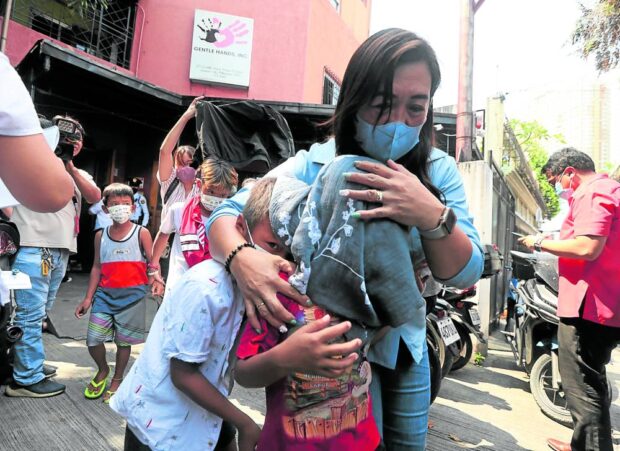
ORPHANED, HOMELESS More than 200 orphans are moved out of the private orphanage Gentle Hands Inc. after it was shut down on Tuesday by the Department of Social Welfare and Development due to various violations. —MARIANNE BERMUDEZ
MANILA, Philippines— Following reports of “disruptive behavior” in children adopted from the orphanage, Gentle Hands Inc. on Wednesday called “ludicrous” and “ridiculous” allegations by the National Authority for Child Care (NACC) that it ill-prepares its kids for adoption.
This follows the NACC’s reports of three disruption cases, which the child care authority claims were caused by Gentle Hands’ “poor preparation— mentally, physically, and emotionally” of their kids prior to adoption.
NACC Undersecretary Janella Ejercito Estrada revealed these cases in a Tuesday press briefing, tagging this the highest incidence of disruptive behavior from a single residential care facility since her term began in August.
“Usec. Janella is pointing out that there seems to be a pattern of disruptive behavior for children who are being placed for adoption from this facility… We will look at the overall licensing issues of Gentle Hands and not just Gentle Hands,” said Department of Social Welfare and Development (DSWD) chief Rex Gatchalian in the same briefing.
Director Charity Graff contested, however, that Gentle Hands Inc. implements a “full discharge policy” every time a child is adopted, consisting of counseling sessions, psychological profiling, onsite meetings with the adoptive parents, and trauma preparation.
“No other agency in this country provides the counseling and discharge sessions that Gentle Hands does. And I would challenge another agency to contest that,” she asserted in a Wednesday Interview with Inquirer.
“For [Estrada] to allegate that we do not prepare our children appropriately for adoption is ludicrous… It’s ludicrous, it’s ridiculous. You shut me down because things are out of my control in another country?” she decried.
DSWD hit Gentle Hands with a cease-and-desist order on Monday, alleging that the orphanage failed to comply with minimum standards for child residential care facilities. DSWD clarified, however, that these disruptive cases are not among the grounds listed in the halt order.
Gentle Hands’ prior interventions ignored
Refuting the NACC’s poor preparation claims, Graff revealed that Gentle Hands has attempted to intervene and work with the NACC on all three cases, only to be met with silence and incomplete information.
The adoption of Child A— who reportedly locked their adoptive parent in a bathroom for over an hour and, in another instance, would throw and step on their food— was not actually greenlit by Gentle Hands, according to Graff.
“The very first [disruption] that happened was a case that we lobbied with ICAB (Inter-Country Adoption Board) and with the NACC to not pursue the adoption, because we did not feel that it was an appropriate match. Prior to the adoption happening, we actually requested that the adoption not happen. NACC did not give us a choice,” said Graff.
Child B—described by Estrada as “disturbed”— allegedly threatened to stab their adoptive parents five separate times.
Graff said that the only information Gentle Hands had received on this case was that the child was “displaying signs of mental illness” upon placement. The NACC did not respond to their intervention recommendations, according to the director.
“Our response to NACC was that we believe that the child needs trauma counseling. We believe that the family needs therapy. We did not receive any answers to our suggestions or recommendations, and we have not been given information that the child has disrupted,” she emphasized.
“We wrote a letter [to the US mental facility] and said we will take that child back on any occasion because that child did not display any of those symptoms while in our care,” she added.
This child, who is currently admitted to a mental facility in the United States, will be brought back to the Philippines this week, according to the child care authority. NACC Assistant Secretary Arezu Jam has been tasked to fetch the child alongside medical personnel from the Department of Health.
Similarly, Graff reported that the NACC has not provided information on the third case other than that the child disrupted from their family in April 2023. The NACC did disclose, however, that Child C’s case is being investigated by US agencies.
“Ito po talaga ay hindi ko pwedeng i-disclose dahil it is under investigation. Pero malaki po yung impact nito sa atin dahil yong case po nito ay marami pong involved na mga agency, hindi lang po dito sa Pilipinas. Actually, yung adoptive parent po ng ating Child C ay nagreklamo na sa US State Department at sa Hague Convention,” Undersecretary Estrada explained.
(I really cannot disclose this because it is under investigation. But this hugely impacts us because this case involves several agencies, not only from the Philippines. Actually, Child C’s adoptive parents complained to the US State Department and to the Hague Convention.)
Graff asserted that the previous child care authority (CCA) of an adopted child cannot be held completely accountable for disruptions once they’ve been placed abroad.
“That is the role of the foreign adoption agency and of the family. If the family had been prepared or if the family had appropriate intervention, perhaps it wouldn’t have disrupted,” she said.
“There is no perfect child. And there is no child that’s not gonna have issues upon adoption. That’s world-wide accepted,” Graff stressed.

